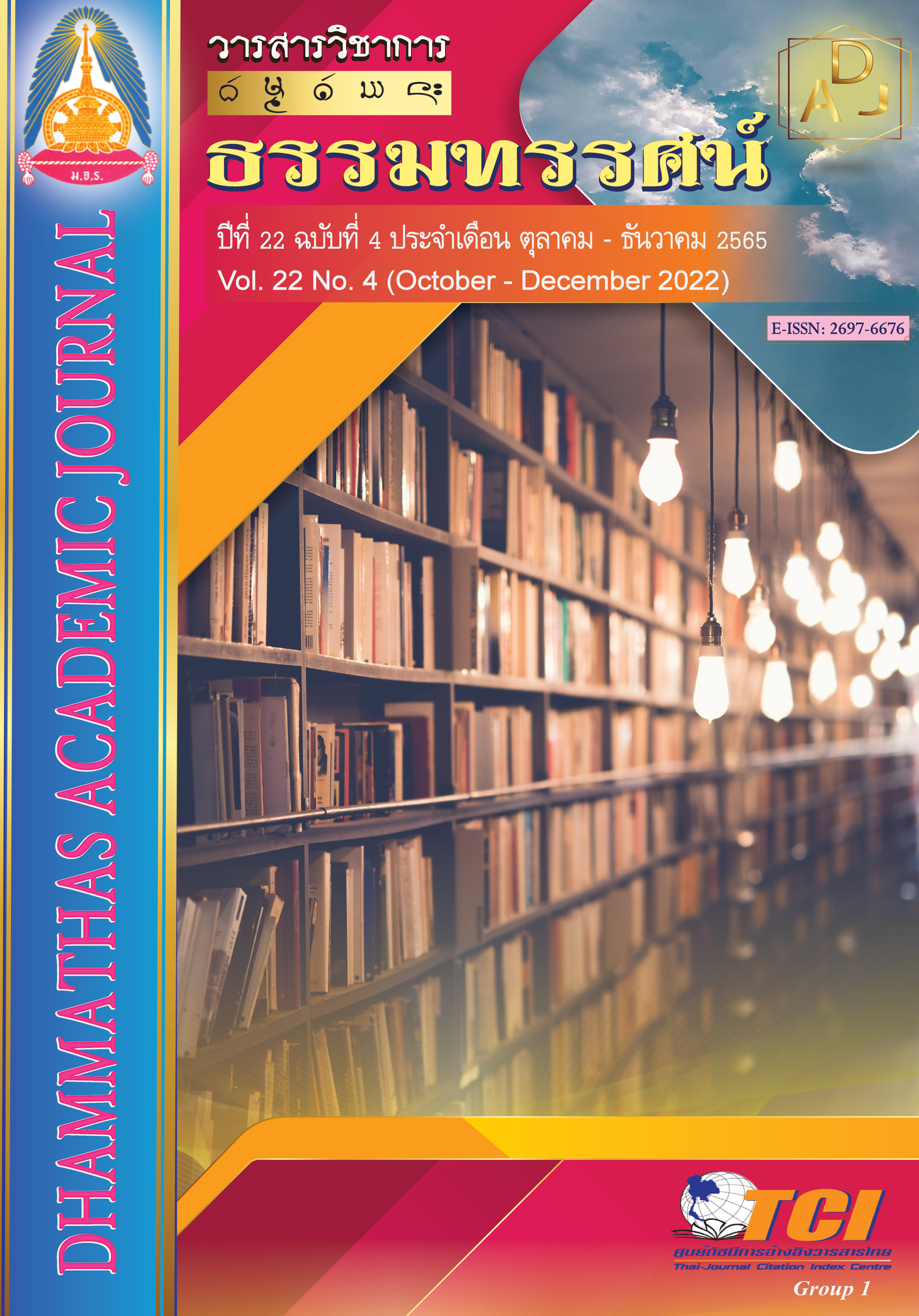The Development of Curriculum for Young children Based on Thai Phuan Local Wisdom in Ban Phue District, Udon Thani Province
Main Article Content
Abstract
The purposes of this research were: 1) to develop a curriculum for young children based on Thai Phuan local wisdom in Ban Phue District, Udon Thani Province and 2) to study its effects a curriculum for young children based on Thai Phuan local wisdom were: 1) to study its effects toward their academic development and self-esteem in of young children 2) A evaluation on the parents' satisfaction towards for the curriculum for young children based on Thai Phuan local wisdom 3) Aevaluation ofearly childhood’s teachers satisfaction towards for the curriculum for young children based on Thai Phuan local wisdom. Research and Development. The sample consisted was 127 young children, 5-6 years old second year kindergarten and the sample obtained using a purposive sampling. The research instruments were: the curriculum for young children based on Thai Phuan local wisdom in Ban Phue District, Udon Thani Province, aevaluation from for academic development and self-esteem for young children and a evaluation satisfaction towards using the Thai Phuan local curriculum. The data were analyzed by percentage and standard deviation.
The research result finds that:
1. The Curriculum for young children based on Thai Phuan local wisdom developed consisted of 6 content groups.
2. Local wisdom and the academic development and self-esteem of the young children, it was found that thecurriculum was congruent of the learners, the contents and activities were suitable for the learners and also promoted all 4 areas of physical development, emotional development, social development and intellectual development and love and pride of local Thai Phuan Ban Phue District, Udon Thani Province. The Parents’ satisfaction towards using the Thai Phuan local wisdom curriculum for early childhood children in Ban Phue District, Udon Thani Province was at a high level. Thai Phuan as a whole is at the highest leveland. The satisfaction of early childhood teachers towards the use of the Thai Phuan Local Wisdom Curriculum was at the highest level.
Article Details

This work is licensed under a Creative Commons Attribution-NonCommercial-NoDerivatives 4.0 International License.
เพื่อให้เป็นไปตามกฎหมายลิขสิทธิ์ ผู้นิพนธ์ทุกท่านต้องลงลายมือชื่อในแบบฟอร์มใบมอบลิขสิทธิ์บทความ ให้แก่วารสารฯ พร้อมกับบทความต้นฉบับที่ได้แก้ไขครั้งสุดท้าย นอกจากนี้ ผู้นิพนธ์ทุกท่านต้องยืนยันว่าบทความ ต้นฉบับที่ส่งมาตีพิมพ์นั้น ได้ส่งมาตีพิมพ์เฉพาะในวารสาร วิชาการธรรม ทรรศน์ เพียงแห่งเดียวเท่านั้น หากมีการใช้ ภาพหรือตารางของผู้นิพนธ์อื่นที่ปรากฏในสิ่งตีพิมพ์อื่นมาแล้ว ผู้นิพนธ์ต้องขออนุญาตเจ้าของลิขสิทธิ์ก่อน พร้อมทั้ง แสดงหนังสือที่ได้รับการยินยอมต่อบรรณาธิการ ก่อนที่บทความจะได้รับการตีพิมพ์References
กิตติศักดิ์ คนแรงดี. (2559). การพัฒนาหลักสูตรท้องถิ่น กลุ่มสาระการเรียนรู้ศิลปะ ระดับมัธยมศึกษาตอนต้นเรื่อง ผ้าทอไทยทรงดำในบริบทร่วมสมัยของจังหวัดสุพรรณบุรี. (วิทยานิพนธ์ครุศาสตรมหาบัณทิต). กรุงเทพฯ: จุฬาลงกรณ์มหาวิทยาลัย.
คธาวุฒิ สมทรง. (2563). การพัฒนาหลักสูตรท้องถิ่น เรื่อง มะพร้าวทับสะแกของโรงเรียนวัดหนองหอย จังหวัดประจวบคีรีขันธ์ โดยใช้กระบวนการวิจัยเชิงปฏิบัติการแบบมีส่วนร่วม. วารสารวิจัยและพัฒนาหลักสูตร, 10(1), 1-15.
ฆนัท ธาตุทอง. (2550). การพัฒนาหลักสูตรท้องถิ่น. นครปฐม: เพชรเกษมการพิมพ์.
เฉลียว ดอนกวนเจ้า, ภูษิต บุญทองเถิง และประสพสุข ฤทธิเดช. (2559). การพัฒนาหลักสูตรท้องถิ่นเรื่องการเสริมสร้างค่านิยมรักความเป็นไทยด้านการแสดงหมอลำเรื่องต่อกลอนของนักเรียนระดับชั้นมัธยมศึกษา. วารสารครุศาสตร์ คณะครุศาสตร์ มหาวิทยาลัยราชภัฏกำแพงเพชร, 2(1), 9-17.
นาถยา แก้วเมฆ, สุพจน์ เกิดสุวรรณ์, สุดาพร พงษ์พิษณุ และวลัยพรรณ บุญมี. (2564). การพัฒนาหลักสูตรประเพณีและวัฒนธรรมไทยทรงดำกลุ่มสาระการเรียนรู้สังคมศึกษา ศาสนา และวัฒนธรรม สำหรับนักเรียนชั้นประถมศึกษาปีที่ 5. วารสารวิชาการศึกษาศาสตร์ ศรีนครินทรวิโรฒ, 22(2), 48-63.
ปัญจพล ไพรหลวง. (2565). การมีส่วนร่วมของคณะกรรมการสถานศึกษาขั้นพื้นฐาน โรงเรียนในกลุ่มเครือข่ายโสมสำราญ สังกัดสำนักงานเขตพื้นที่การศึกษาประถมศึกษาอุดรธานี เขต 4. วารสารมจร อุบลปริทรรศน์, 7(1), 111-126.
ปัณฉัตร หมอยาดี. (2562). วิธีการสืบทอดวัฒนธรรมของชาวไทยพวนในอำเภอบ้านผือ จังหวัดอุดรธานี. นนทบุรี: มหาวิทยาลัยสุโขทัยธรรมาธิราช.
ปิยะมาศ ทองเปลว และอำนาจ ชนะวงศ์. (2561). การพัฒนาโปรแกรมเสริมสร้างสมรรถนะการจัดการเรียนรู้ของครูปฐมวัยสำหรับสถานศึกษา สังกัดสำนักงานเขตพื้นที่การศึกษาประถมศึกษาอุดรธานี เขต 4. วารสารศึกษาศาสตร์ มหาวิทยาลัยมหาสารคาม, 12(2), 156-168.
พรกมล สุมงคล, ปราโมทย์ จันทร์เรือง และเนติ เฉลยวาเรศ. (2555). การพัฒนาหลักสูตรท้องถิ่นเรื่องอาหารจากบัวสาย กลุ่มสาระการเรียนรู้การงานอาชีพและเทคโนโลยีสำหรับนักเรียนชั้นประถมศึกษาปีที่ 5 อำเภอบางปลาม้า จังหวัดสุพรรณบุรี. วารสารสังคมศาสตร์วิจัย, 3(2), 5-25.
รัชฎาภรณ์ ทีปสว่าง. (2553). ความคาดหวังของผู้ปกครองในการจัดการศึกษาระดับปฐมวัยของตำบลโนนทอ อำเภอบ้านผือ จังหวัดอุดรธานี. (วิทยานิพนธ์ครุศาสตรมหาบัณฑิต). กรุงเทพฯ: มหาวิทยาลัยราชภัฏสวนดุสิต.
ศศิธร อินตุ่น, วีระศักดิ์ ชมพูคำ และอรทัย อินตา. (2563). การบูรณาการภูมิปัญญาท้องถิ่น: การพัฒนาหลักสูตรภูมิปัญญาท้องถิ่นสําาหรับจัดกิจกรรมเสริมทักษะในโรงเรียนประถมศึกษา อําเภอดอยหล่อ จังหวัดเชียงใหม่. วารสารศึกษาศาสตร์ มหาวิทยาลัยมหาสารคาม, 14(1), 260-273.
สำนักงานเขตพื้นที่การศึกษาประถมศึกษาอุดรธานี เขต 4. (2562). แผนพัฒนาการศึกษาสำนักงานเขตพื้นที่การศึกษาประถมศึกษาอุดรธานี เขต 4 ระยะ 3 ปี. กรุงเทพฯ: กระทรวงศึกษาธิการ.
สุชาดา น้ำใจดี. (2561). คุณลักษณะของสื่อบุคคลกับการถ่ายทอดภูมิปัญญาท้องถิ่น. วารสารชุมชนวิจัย, 12(3), 1-13.
อรทัย ภู่หงส์, สุทธิพงศ์ ผดุง และธีระดา ภิญโญ. (2557). การพัฒนาหลักสูตรปฐมวัย กรณีศึกษา โรงเรียนเทศบาลป้อมแผลงไฟฟ้า จังหวัดสมุทรปราการ. วารสารบัณฑิตศึกษามหาวิทยาลัยราชภัฏสวนสุนันทา, 1(2), 95-102.
อรุณี หรดาล. (2562). ภูมิปัญญาท้องถิ่นกับพัฒนาการเด็กปฐมวัย. วารสารสักทอง:มนุษยศาสตร์และสังคมศาสตร์, 25(2), 1-11.
Armstrong, D. G. (1989). Developing and documenting the curriculum. Boston: Allyn and Bacon.
Hongphu, O., Boonphadung, S. and Pinyo, T. (2014). The Development of Curriculum for Early Childhood Chidren: A Case Study of Tessaban Pomplangfaifa School in Samuthaprakan. SSRU Graduate Studies Journal Suan Sunandha Rajabhat University, 1(2), 95-102.

